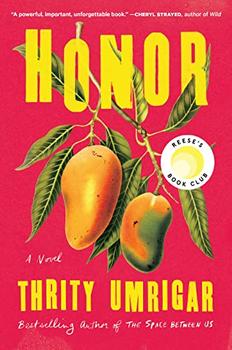Book Club Discussion Questions
In a book club? Subscribe to our Book Club Newsletter!
For supplemental discussion material see our Beyond the Book article, Escalating Anti-Muslim Sentiment in India and our BookBrowse Review of Honor.
Please be aware that this discussion guide will contain spoilers!
- Smita tells Mohan that her India is not his India. What does she mean?
- How is Meena's India different from Smita's? What explains the differences?
- Meena relates her story to us directly, in the first person. Why do you think the author chose this point of view?
- Meena's brothers think they are doing the moral thing, the right thing, by punishing their sister and her husband. Honor killings are a fact of life in many parts of the world. What do you think it will take to change this cultural practice?
- What do you think of a system where the village council and the head of that council have so much power? What are the consequences of those positions being held by men?
- Why didn't Smita's father change their name back to their family name after settling in America? Do you understand why he didn't?
- Smita and Meena both fall in love. How do their cultures inform their relationships: the level of intimacy, communication, decision-making for each woman? If you are in a committed relationship, how do you think it would have been affected if it had begun in a different culture?
- As strange as the customs and traditions described in this book may seem to an American reader, did you recognize any common touchpoints across the two cultures? What aspects of the novel reminded you of life in America?
- Trace Mohan's evolution in the course of his travels with Smita.
- What do you think of Smita's decision in the conclusion of the novel? What do you foresee for the future of Smita and Mohan?
- There are many different levels of privilege described in this book. What are some of them and how do they affect the characters' behavior?
- There is a moment when Smita remembers the marigolds tied around the oxen's horns, and it makes her feel tender toward India. Why?
- The notion of objectivity is the foundational belief in mainstream American journalism. What happens when journalists cover places and people whose culture is completely different from theirs? Should they strive to be objective or should they identify a moral ground from which to report a story? If so, how do they determine what that moral ground should be? Or are they imposing their morality on others?
- What do you think of the final chapter? What function does it serve?
- What are the various meanings of the book's title?
Download Book Club Kit
Unless otherwise stated, this discussion guide is reprinted with the permission of Algonquin Books.
Any page references refer to a USA edition of the book, usually the trade paperback version, and may vary in other editions.
For supplemental discussion material see our Beyond the Book article, Escalating Anti-Muslim Sentiment in India and our BookBrowse Review of Honor.
